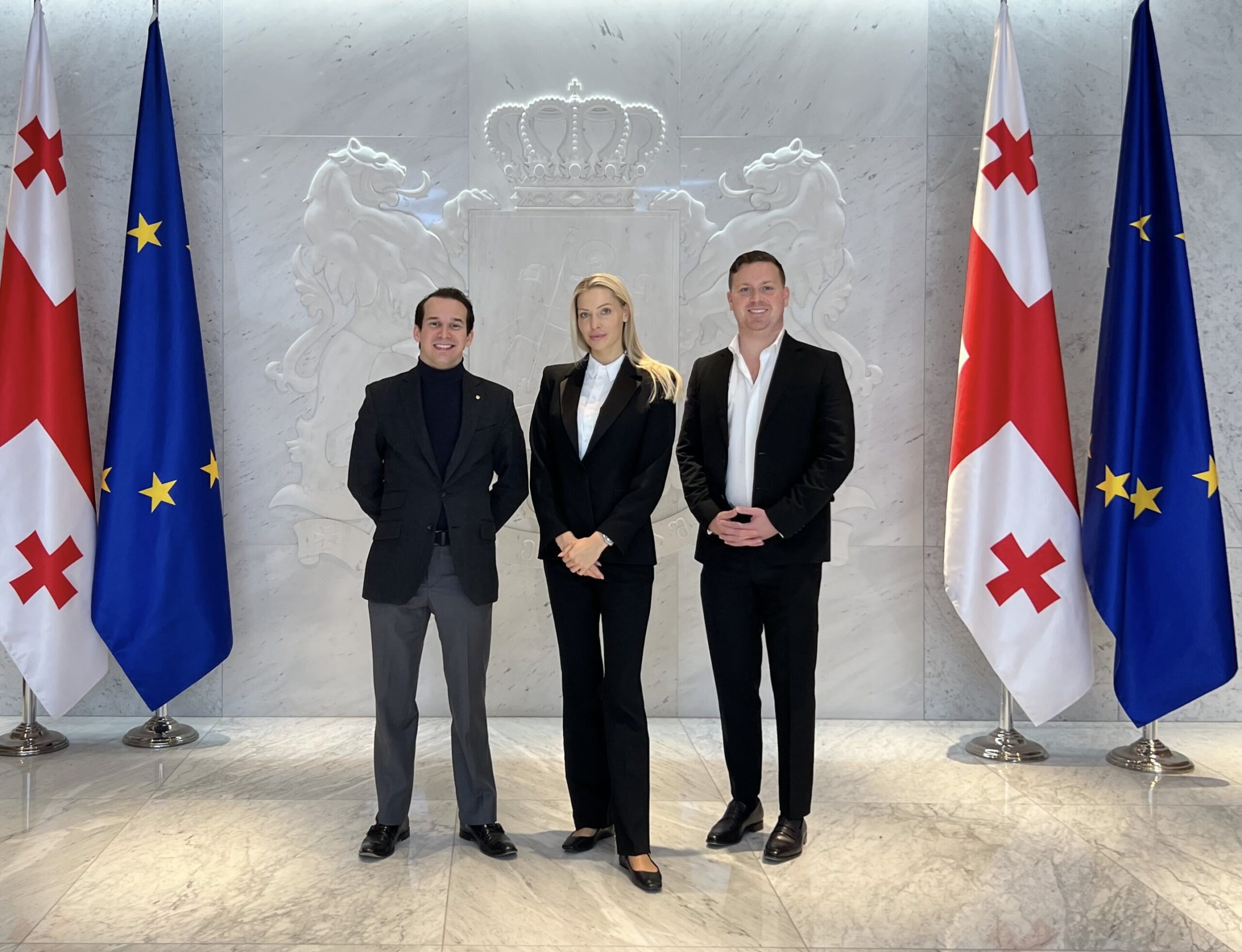
Last week, the Partisia Blockchain team journeyed to Georgia, a land rich in cultural heritage as the birthplace of wine and now at the forefront of blockchain innovation. Here is a short recap of our fruitful trip.
Last Thursday marked a milestone as Partisia Blockchain formalized its collaboration with the Georgian Innovation and Technology Agency (GITA) through the signing of a Memorandum of Understanding (MoU). This pivotal agreement with GITA under the Ministry of Economy and Sustainable Development sets the stage for collaborative efforts aimed at driving advancements in Web3 technology, both within Georgia and the wider Caucasus. By leveraging their combined expertise and resources, Partisia Blockchain and GITA will explore innovative solutions and applications of blockchain technology, fostering joint support for innovative projects, educational initiatives and frameworks for implementation. This collaboration signifies a commitment to shaping the digital transformation landscape, contributing to economic growth, innovation and societal development in Georgia and beyond.
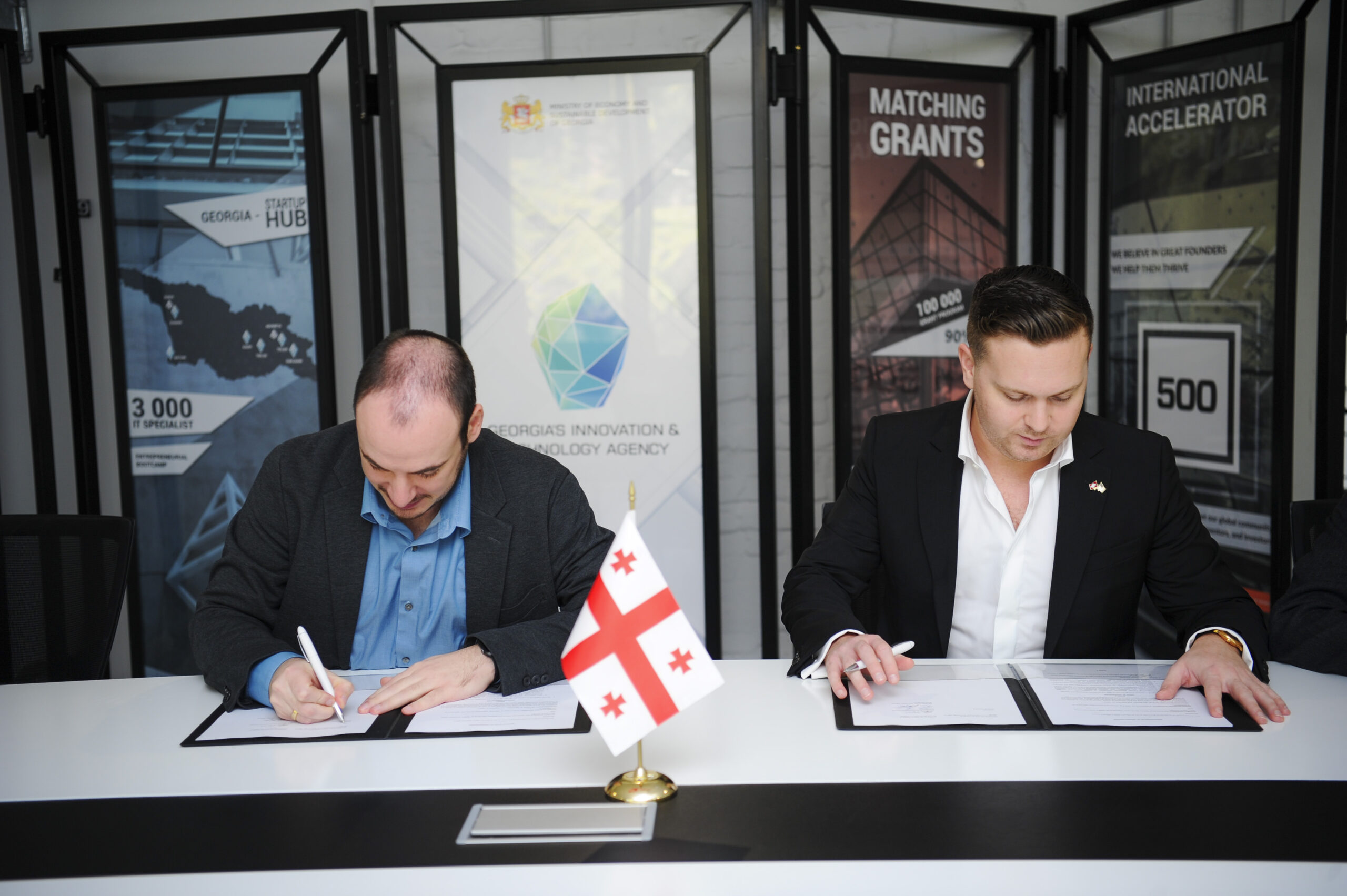
Our team had the pleasure of meeting with members of the Georgian Web 3.0 community, where we showcased the transformative potential of Partisia Blockchain and multiparty computation (MPC) technology, our latest MOCCA solution and a range of other advantages of MPC. Additionally, we introduced our Grants Program aimed at fostering innovation in the Caucasus. In Tbilisi, we were treated to an exclusive demo of the Nova Miningverse video game, a tangible showcase of Partisia Blockchain’s capabilities. This was followed by an informal meeting with the team behind the game.
Last Friday began with a meeting with Razhden Kuprashvili, Head of the Georgian Anti-Corruption Bureau and his team at the Administration of the Government of Georgia. We discussed the potential of MPC and blockchain technology in combating corruption. Later, we exchanged ideas with entrepreneur Vako Turnava at the offices of his companies Sweeft and Skillwill. Conversations revolved around the various applications of MPC and privacy-enhancing technologies, emphasizing the importance of education and training.
This trip showcased the possibilities of blockchain technology and strengthened our commitment to driving positive change in Georgia and beyond. Stay tuned for updates as we continue to push the boundaries of innovation and collaboration in the world of Web 3.0.
Stay updated: Website • X • Discord • Telegram • LinkedIn • Facebook • Instagram • GitLab • Medium • YouTube
TBILISI, 8 FEBRUARY 2024. Today, Partisia Blockchain, a leader in privacy-preserving, interoperable and sustainable blockchain solutions, achieved a significant milestone in advancing innovation by solidifying ties with Georgia’s Innovation and Technology Agency (GITA) under the Ministry of Economy and Sustainable Development. The signing of a Memorandum of Understanding in Tbilisi marks a pivotal moment in the ongoing efforts to promote innovation using multiparty computation (MPC) and blockchain technologies in Georgia.
The ceremony in the Caucasus nation’s capital follows the successful launch of Partisia Blockchain’s MPC On-Chain Custody Advanced solution (MOCCA) and discussions during the World Economic Forum in Davos about future endeavors with potential partners.
The signing ceremony in Tbilisi drew national state officials, Georgian blockchain industry players, students, Tbilisian press corps and the Partisia Blockchain delegation.
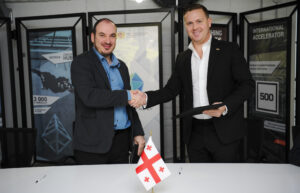
Brian Gallagher, Co-Founder of Partisia Blockchain, says:
“Today’s signing with GITA goes beyond paperwork. It signifies our commitment to driving innovation in Georgia and beyond. Our combined expertise in MPC and blockchain will bring new secure, transparent and decentralized solutions. This initiative exemplifies the power of combining expertise from the public and private sectors. Together, we will shape the future of blockchain technology, ensuring its responsible and widespread adoption.”
In this groundbreaking initiative, GITA and Partisia Blockchain are set to fuel innovation by working closely. GITA will provide crucial support for Partisia Blockchain’s involvement in Georgian blockchain and Web3 ecosystem. Simultaneously, Partisia Blockchain will lend its expertise to assess and contribute to projects in GITA programs, extending grants and technical support where needed.
Ensuring seamless communication, GITA will act as a bridge, fostering dialogue between Partisia Blockchain and various stakeholders, including the Georgian public and private sectors and academia.
Education is a cornerstone of this understanding. Partisia Blockchain will play a key role in shaping the minds of participants in GITA’s educational programs, contributing insights on MPC, homomorphic encryption and their integration with blockchain technology. This commitment to education reflects the shared vision of advancing technology while ensuring knowledge and understanding pave the way for a sustainable future.
Avtandil Kasradze, Chairperson of Georgia’s Innovation and Technology Agency, emphasized the significance of the understanding:
“GITA is excited to join forces with Partisia Blockchain. This understanding aligns with our mission to integrate cutting-edge technologies into various economic sectors, fostering innovation and ensuring a competitive edge for Georgia. By collaborating with industry leaders like Partisia Blockchain, GITA aims to propel Georgia to the forefront of technological innovation. We look forward to a fruitful understanding that will benefit our nation and the global technology community.”
Partisia Blockchain is committed to playing an active role in GITA’s initiatives, contributing meaningfully to the local and global blockchain conversation.
About Partisia Blockchain: Partisia Blockchain brings unparalleled opportunities by empowering privacy-preserving, interoperable and sustainable innovation for fairness and transparency. It fuels the most secure and efficient networks to solve global problems. Distilled with 35 years of rigorous research, Partisia Blockchain future-proofs solutions, solves tomorrow’s challenges by powering fair, secure, distribution of benefits. While preserving privacy and confidentiality, it brings accountable, transparent and decentralized governance. Learn more: www.PartisiaBlockchain.com
About Georgia’s Innovation and Technology Agency (GITA): Georgia’s Innovation and Technology Agency (GITA) under the Ministry of Economy and Sustainable Development is dedicated to fostering innovation and technology. By prioritizing infrastructure development, opening technoparks and innovation centers, GITA aims to integrate cutting-edge technologies into all economic sectors. The state Agency focuses on increasing investment capital, engaging private businesses and enhancing research through effective processes. GITA’s commitment extends to widespread internet access, quality training, and incentives to drive innovation and technology development, ensuring a competitive edge. Learn more: www.gita.gov.ge
Stay updated: Website • X • Discord • Telegram • LinkedIn • Facebook • Instagram • GitLab • Medium • YouTube
Introducing Partisia Blockchain’s highly anticipated AirDrop program. We are thrilled to launch the Partisia Blockchain AirDrop program. It marks a significant milestone for ecosystem adoption. With the upcoming governance vote for the MPC token transferability just around the corner, this is a testament for the Partisia Blockchain’s vision. The program features an impressive pool size of 25 million MPC tokens. The program offers an unparalleled opportunity for the early adopters of the Partisia Blockchain.
The first tranche of the 25 million MPC token AirDrop program will kickstart the further expansion of our ecosystem.
As we prepare for the MPC token listing – outlined in the December 2023 update – this AirDrop program is designed to invigorate the ecosystem. For the début AirDrop tranche, we value continuous activity and contributions within the ecosystem. Detailed participation information is available on the official AirDrop program webpage.
In the last 12 months, the Partisia Blockchain ecosystem has rapidly grown. It attracts builders and innovators from various industries, and this is your chance to be rewarded for participating in the official launch. Innovators, such as MetaNames, are offering decentralized domain name services are prime examples. The deployment of these dApps to mainnet is a crucial step in fostering growth and creating a synergistic ecosystem. They empower and bring to life collaborations between dApps and broadening the scope of new use cases. As the AirDrop program takes place, more dApps will deploy on mainnet to chart an exciting AirDrop journey. We encourage participants to deploy their own contracts with the smart contract IDE, DApp playground.
Stay updated: Website • X • Discord • Telegram • LinkedIn • Facebook • Instagram • GitLab • Medium • YouTube
January marked a strong start to 2024 for Partisia Blockchain, featuring groundbreaking developments and strategic partnerships that define our dynamic journey for the year. Unveiling the revolutionary MPC On-Chain Custody Advanced (MOCCA) solution in Davos, we explored the transformative potential of MPC and delved into its pivotal role in reshaping the digital landscape. Engaging in impactful discussions during the World Economic Forum, we highlighted the importance of blockchain in rebuilding trust and announced collaborations with five innovative projects. Interviews with our thought leaders shed light on the evolving digital terrain, covering artificial intelligence discussions in Davos and the potential of Web3 and MPC. As we venture into February, exciting initiatives include the AirDrop program and a thriving Hackathon, accompanied by significant tech highlights, promising a month of continued innovation.
Partisia Blockchain introduced a revolutionary leap in decentralized custody solutions with the unveiling of MOCCA (MPC On-Chain Custody Advanced solution) in Davos during the World Economic Forum. MOCCA stands out for its decentralized and programmable multichain custody, offering enhanced security, compliance, and privacy. Backed by 35 years of MPC research, MOCCA addresses limitations of traditional smart contracts and centralization, providing institutions and organizations with genuine decentralization and flexibility in securing digital assets across multiple chains. Notable features include fully programmable custody smart contracts, blockchain-agnostic multichain functionality, and swift, cost-effective deployment directly on-chain.
Davos 2024 marked a week of unparalleled influence and innovation for Partisia Blockchain, solidifying its presence on Promenade during the World Economic Forum (WEF) for the second consecutive year. The launch of the MOCCA solution set a new industry standard, addressing infrastructure fortification, transparency, and expanded usability. Discussions in Davos focused on the pivotal role of blockchain in rebuilding trust, with an increased emphasis on regulatory landscapes, particularly Europe’s MiCA regulation and global supervisory actions. Brian Gallagher, Co-Founder of Partisia Blockchain, emphasized the importance of building decentralized trust networks, and discussions spanned cross-chain liquidity, Central Bank Digital Currencies (CBDCs), stablecoins, cybersecurity priorities, and identity management. We were proud to have Shirly Valge, Chief of Growth, participate in the first-ever Women in Web3 Global Summit, connecting with visionary women leaders. Beyond more than 40 engagements, fruitful meetings resulted in letters of intent, collaborations, and agreements, making Davos 2024 a landmark event shaping the future of blockchain through regulatory advancements and technological breakthroughs, highlighting the industry’s commitment to innovation and trust-building.
Kurt Nielsen explored the transformative potential of multiparty computation (MPC) for 2024 in a recent blog. Partisia Blockchain envisions MPC becoming fundamental for secure, collaborative digital interactions. Key highlights include mainstream integration across industries, with a focus on finance and healthcare for safeguarding sensitive data. MPC will revolutionize decentralized identity, enhance privacy in blockchain, offer quantum-ready solutions, and accelerate innovation in artificial intelligence and machine learning. Financial sectors and healthcare research will lead MPC adoption, while DeFi expands beyond blockchain, addressing edge computing security and driving standardization initiatives.
In recent press interviews, Partisia Blockchain’s thought leaders shared valuable insights into the rapidly evolving digital landscape. Shirly Valge engaged in an insightful conversation with CoinDesk in Davos, delving into discussions where AI took center stage. As our Chief of Growth, she provided a unique perspective on the dynamic landscape. Brian Gallagher, Co-Founder of Partisia Blockchain, explored the potential of Web3 and secure multiparty computation (MPC) in an interview with the Human and Machine Channel. The discussion centered around how MPC ensures data privacy in the ever-evolving digital realm.
This year’s first month has been a flurry of activities with new partnerships. And Davos was a perfect platform for partnerships. During the World Economic Forum, we announced new projects partnering with Partisia Blockchain.
February marks the launch of the Partisia Blockchain AirDrop program. With the upcoming governance vote for the MPC token transferability just around the corner, this is a testament for the Partisia Blockchain’s vision. The program features an impressive pool size of 25 million MPC tokens. The program offers an unparalleled opportunity for the early adopters of the Partisia Blockchain. The first tranche of the 25 million MPC token AirDrop program commencing on 1 February 2024 will kickstart the further expansion of our ecosystem. Our Hackathon is moving along well with close to one thousand participants. The end of the Hackathon is set for 13 February 2024, and judging to conclude by March. We are anticipating to see some great projects come out of it. And do not miss the Crypto Stalkers AMA this month. Tiago Serôdio is going to introduce the Crypto Stalkers community to Partisia Blockchain and will answer their questions.
The node operators voted in favor of onboarding USDT as a BYOC token. This now adds another stable token as a form of payment to the Partisia Blockchain network. Another proposal to expand the BYOC portfolio will be put forward this month. The node operators will be asked to vote for the inclusion of the wBTC token into the BYOC portfolio. Finally, the Partisia Blockchain team will be attending ETH Denver from 23 February until 3 March. The delegation will consist of key persons and look forward to meeting you in Colorado.
Stay updated: Website • X • Discord • Telegram • LinkedIn • Facebook • Instagram • GitLab • Medium • YouTube
For the second consecutive year, Partisia Blockchain took center stage in Davos during the World Economic Forum (WEF), marking a milestone with the largest delegation to date. Despite the cold weather, tight security and a packed agenda, our mission to promote Partisia Blockchain remained unwavering, leading to more than 45 engagements—spanning keynote addresses, panel discussions, industry sessions and speeches over five dynamic days.
A defining moment occurred in Davos with the launch of our MPC On-Chain Custody Advanced (MOCCA) solution. This decentralized, programmable, multichain custody solution set a new industry standard, addressing the pressing need for fortified infrastructure, transparency and expanded usability.
The WEF’s overarching theme, “Rebuilding trust”, framed numerous discussions on blockchain’s pivotal role in restoring trust. Our engagements with decision-makers consistently highlighted blockchain and other innovative technologies as essential tools in the pursuit of regaining trust.
Davos 2024 witnessed an increased focus on the regulatory landscape within the blockchain sphere. Discussions delved into Europe’s MiCA regulation and actions by global supervisory bodies. The consensus underscored the vital role of key infrastructure, exemplified by Partisia Blockchain, in strengthening security, privacy and transparency. This regulatory exploration unfolded amidst a surge of interest in decentralized finance (DeFi) and tokenization.
In DeFi, stakeholders explored its potential to rebuild trust through enhanced reliability. Conversations spanned liquidity, risk management and the disruptive impact on traditional finance, with trustless technology emerging as a viable solution. Tokenization, powered by blockchains like ours, took center stage, showcasing its transformative capacity to simplify securities issuance and provide irrefutable ownership through immutable records.
Trust, a pervasive theme in Davos, seamlessly aligned with Partisia Blockchain’s mission. Insights from Brian Gallagher, our Co-Founder, emphasized the importance of building decentralized trust networks. The regulatory imperative for managing risk across digital asset markets highlighted the collective responsibility required for a resilient and inclusive market environment. Technology’s role in enhancing transparency and mitigating risks showcased blockchain’s potential.
Brian Gallagher emphasized cross-chain liquidity’s necessity, pointing to the vital role of multichain solutions. Discussions on Central Bank Digital Currencies (CBDCs) and stablecoins explored their harmonious coexistence, delving into regulatory nuances, stability and trust. The week culminated with a focus on cybersecurity priorities, positioning blockchain’s collective responsibility as pivotal for a secure digital future.
Identity management as part of trust building was a key conversation in Davos. Shirly Valge, our Chief of Growth, participated in a panel on Web3 and digital identity, highlighting user data control and fraud prevention. The recurring theme of infrastructure underscored blockchain’s foundational role in shaping the evolving Web3 landscape. Security, a constant thread, scrutinized Bitcoin mining, digital identity and the Web3 venture landscape, emphasizing the need for technology to balance scalability, usability, interoperability and digital security.
Beyond engagements, the Partisia Blockchain delegation held fruitful meetings with potential partners, resulting in letters of intent, collaborations and agreements.
In retrospect, Davos 2024 stands as a landmark event, revealing transformative themes that will undoubtedly shape the future of blockchain. From regulatory advancements to technological breakthroughs, the week served as a testament to the industry’s commitment to innovation and trust-building.
Read our daily wraps here: 15 January 2024, 16 January 2024, 17 January 2024, 18 January 2024, 19 January 2024
Stay updated: Website • X • Discord • Telegram • LinkedIn • Facebook • Instagram • GitLab • Medium • YouTube
Welcome to our rundown of the final day at Davos! We have had a packed schedule this week during the World Economic Forum (WEF). Over the last four days we have attended more than 45 sessions and events, launched our very own MOCCA (MPC On-Chain Custody Advanced) solution at a keynote address, and participated in a panel on cross-chain liquidity.
Without further ado, here are today’s themes and highlights:
Our Chief of Growth, Shirly Valge, took the stage. This time she featured on a panel on Web3 and digital identity (dID)—a topic very close to our hearts. Panelists touched on user data control, fraud, and compatibility issues between various eID, dID and SSI systems. Shirly highlighted our recent eID minimum viable product (MVP) for the Swiss government, a decentralized self-sovereign identity solution that uses multiparty computation (MPC) on the blockchain to enable data privacy, security, and control. The panel also highlighted the growing need for self-sovereign identities and the necessity for the governments to ensure the utmost security of individuals’ private data.
A main thread throughout today and during the entirety of Davos has been infrastructure. The sentiment was that, fundamentally, there must be a focus on infrastructure if we want to make transacting easier, cheaper, and more efficient in the Metaverse or Web3. With blockchain as the “pipes” and smart contracts to help direct traffic we have technology that can potentially serve multiple user needs—which brings us to the next theme.
Security was prominent today and in most sessions throughout the week, whether implicitly or explicitly. Today, it was security in Bitcoin mining, digital identity, and in the Web3 venture landscape. As an essential part of trust, a key theme of WEF, the feeling in Davos was more of a question: how can technology facilitate trust? To that end, discussions, both in sessions and in person, focused on solutions that specifically balance scalability, usability, interoperability with digital security and privacy.
Stay updated: Website • X • Discord • Telegram • LinkedIn • Facebook • Instagram • GitLab • Medium • YouTube
Welcome to our rundown of the fourth day at Davos. We had another busy day filled with sessions and meetings. Below are the main themes and highlights for this penultimate day:
Cross-chain liquidity is essential for the efficient functioning of digital assets and decentralized finance (DeFi) markets. Partisia Blockchain Co-Founder Brian Gallagher spoke about the necessity of multichain solutions, like our just-yesterday-released MOCCA (MPC On-Chain Custody Advanced) solution. This is a programmable, decentralized, multichain custody solution that makes custody of digital assets significantly easier. Here, as was discussed on the panel, it is important that users be able to bridge assets on their preferred blockchains, making blockchain agnostic products key. The panelists also discussed important topics like AML, regulation, and protocol interoperability. What stood out was that regulators worldwide are adapting to the realities of DeFi and revisiting existing legislations to facilitate the adoption of new class of assets.
CBDCs and stablecoins have been a key part of discussions around cryptocurrencies over the past year, both positive and negative. Yet, as many nations have already launched or are planning to roll out CBDC pilots and the world is entertaining cashless societies, how CBDCs and stablecoins can co-exist alongside one other to increase financial inclusion needs to be considered. The panel on these two items was sweeping, considering regulation, stability, trust, and even collaboration between stablecoins and CBDCs. A certain fact is that more central banks will pilot CBDCs in the coming years.
One of the threads throughout the World Economic Forum (WEF) has been trust, and related security. Today, we attended WEF’s session on navigating cybersecurity. Something particularly important is that, according to WEF, 43% of organizational leaders estimate that in the next two years they will experience a damaging cyber-attack. The sentiment in this session was that cybersecurity is a collective responsibility and blockchain technology has a greater role to play.
Stay updated: Website • X • Discord • Telegram • LinkedIn • Facebook • Instagram • GitLab • Medium • YouTube
Welcome to our rundown of the third day at Davos. Today, besides meetings and attending sessions, we launched our very own decentralized, programmable, multichain and multiparty computation (MPC) on-chain product: MPC On-Chain Custody Advanced solution. In short – MOCCA. A custody milestone. This slated nicely into the day’s big themes:
Crypto markets were a key point of focus. Market-making and its intersection with algorithmic trading, market makers’ roles in price stability and volatility mitigation, and emerging trends were discussed. Our announcement of our MOCCA (MPC On-Chain Custody Advanced solution) during our keynote address highlighted how a decentralized, programmable, and multichain solution can redefine securing digital assets and make custodial management significantly easier. A need particularly relevant with the recent spot Bitcoin approvals by the US SEC.
Security, privacy, and transparency were the next major themes. This is reflected in the World Economic Forum’s (WEF) main focus for this year “Rebuilding trust” by honing on the fundamental principles fueling it, specifically transparency, consistency, and accountability. Panelists spoke on the importance of balancing transparency, security, and privacy in decentralized systems—a need fulfilled by our MOCCA product, alongside regulatory oversight. The main takeaways of which were that the industry needs infrastructure that will enhance transparency and help it widen its use.
Lastly, the financing side of the market was point on center stage. Contributors and founders gave an overview of their liquid crypto underwritings, the role of trading platforms in liquidity provision, and risks. The key takeaways were that liquid assets can offer contributors significant upside while mitigating much of the risk normally associated with financing in the asset class and the importance of technology, which facilitates trust between multiple parties.
We also had many meetings and attended thought-provoking sessions, such as WEF’s session on the risks and opportunities artificial intelligence (AI) brings into our daily lives. The Wall Street Journal’s session on managing risks, technology and compliance echoed our firm belief that tech plays a critical role in managing risks.
Stay updated: Website • X • Discord • Telegram • LinkedIn • Facebook • Instagram • GitLab • Medium • YouTube
DAVOS, 17 JANUARY 2024. Today in Davos, Partisia Blockchain unveiled its latest product – MOCCA (MPC On-Chain Custody Advanced solution). The MOCCA solution revealed during the World Economic Forum is a decentralized and fully programmable multichain custody solution designed to redefine the landscape of securing digital assets and ease custodial management.
The key differentiators of MOCCA from the existing custody solutions are its decentralized and enhanced programmability through smart contracts, blockchain agnostic multichain functionality, advanced security and compliance, and configurable privacy.
Peter Frandsen, Chief Technology Officer at Partisia Blockchain, says:
“MOCCA solution marks a significant milestone in the evolution of decentralized custody; it addresses the current limitations of traditional smart contracts and centralization. MOCCA empowers institutions and organizations with genuine decentralization, advanced programmability and the flexibility to secure digital assets across multiple chains. Backed by our decades-long expertise in multiparty computation (MPC), this product is our commitment to delivering cutting-edge solutions that redefine the standards of security, compliance, and innovation in the blockchain space.”
Partisia Blockchain’s latest MOCCA product addresses the limitations of inflexible and centralized custody solutions, offering genuine decentralization while providing full programmability. This is especially beneficial for institutions, decentralized autonomous organizations (DAOs), wallet providers and exchanges seeking trustless collaboration on securing digital assets.
The fully programmable nature of MOCCA’s custody smart contracts enable policies such as the addition or removal of signers, modification of threshold signature schemes and voting powers, integration of NFTs with special permissions, implementation of specific rules for transaction categories and much more.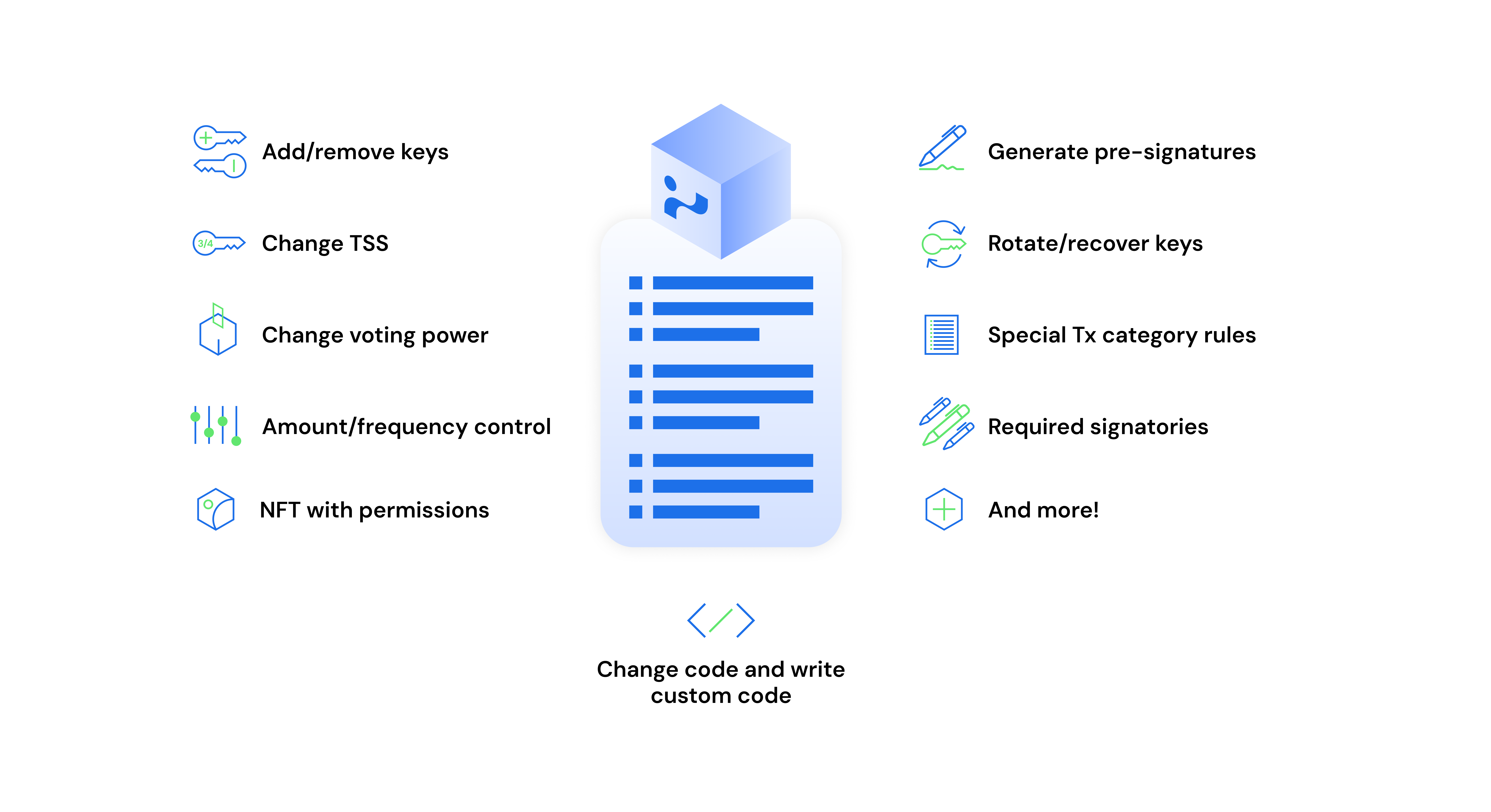
Users can choose to bridge assets to Partisia Blockchain or secure assets on their preferred blockchains, offering flexibility and choice. Deployment is swift and cost-effective, directly on-chain, with customizable templates and tools. The MOCCA solution is designed to be blockchain agnostic, relying on MPC technology independent of protocol support.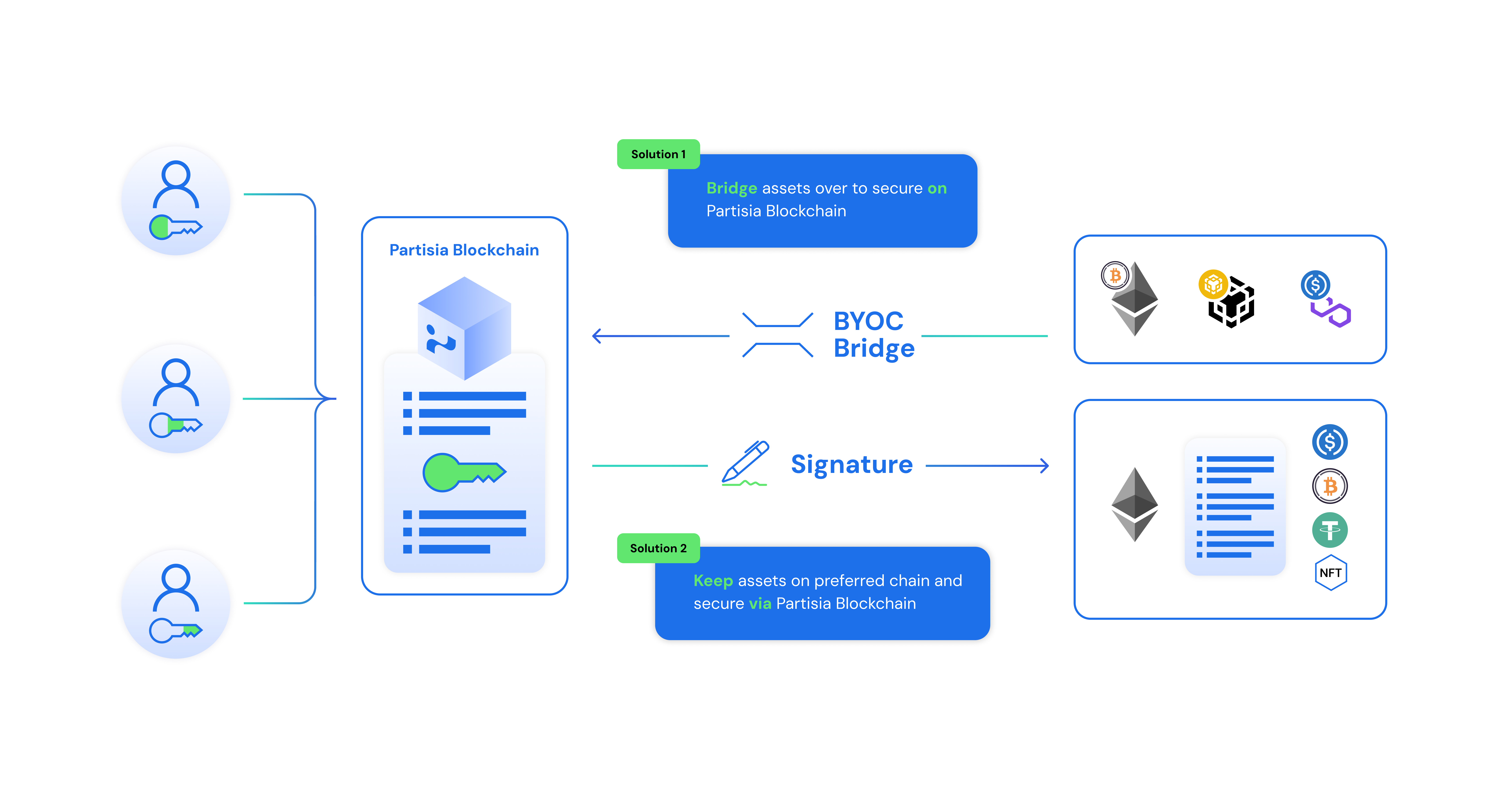
Backed by 35 years of MPC research, Partisia Blockchain’s newest MOCCA solution ensures security and compliance. Advanced features, such as off-chain signing and key decentralization contribute to safeguarding substantial funds against potential threats. Public blockchains enable automatic key rotation and adjustable transparency levels, ensuring robust protection against attacks. Partisia Blockchain’s MOCCA goes beyond standard custody offerings by introducing security-audited standard policies and allowing for arbitrary code logic.
MOCCA deploys on public blockchains where its code and state are visible. However, key shards are exclusively generated and stored by users or MPC clusters, and then submitted to the decentralized MPC protocol. This allows participants to actively engage in governance and sign transactions directly on-chain—a significant advantage over commonly used TSS protocols, which are challenging to modify once deployed.
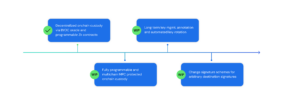
MOCCA Roadmap
Partisia Blockchain’s MOCCA represents a paradigm shift in custody solutions, offering unparalleled decentralization, security, ease and programmability. The solution is poised to meet the diverse needs of institutions and organizations navigating the complexities of managing digital assets in today’s dynamic landscape.
About Partisia Blockchain: Partisia Blockchain brings unparalleled opportunities by empowering privacy-preserving, interoperable and sustainable innovation for fairness and transparency. It fuels the most secure and efficient networks to solve global problems. Distilled with 35 years of rigorous research, Partisia Blockchain future-proofs solutions, solves tomorrow’s challenges by powering fair, secure, distribution of benefits. While preserving privacy and confidentiality, it brings accountable, transparent and decentralized governance. Learn more: www.PartisiaBlockchain.com
Stay updated: Website • X • Discord • Telegram • LinkedIn • Facebook • Instagram • GitLab • Medium • YouTube